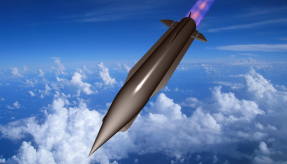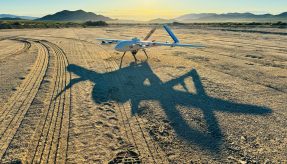
Speaking at DPRTE Engage Online, Andrew Forzani, Chief Commercial Officer, UK Ministry of Defence, examined what lessons the defence industry could learn from the COVID-19 pandemic.
The impact of COVID-19 has seen a shift in the public perception of the functions of the defence industry. The defence supply chain was heavily involved in the delivery of personal protective equipment (PPE) supply chains, while the Armed Forces formed a COVID Support Force, which played play a key role in helping with NHS logistics, manning emergency call centres and setting up mobile testing centres.
Instilling some sense of certainty was crucial to the MOD in its relationship with suppliers with regards to contracts and payments.
Delivering his Keynote address at DPRTE Engage Online 2020, Mr Forzani explained: “One of the key messages that came back from industry right from the beginning was the importance of having confidence that business would continue during this period. Contracts would continue to be awarded; programmes would continue wherever possible; money would keep flowing; payments would still be made and cashflow would not stop.
“What was really important to the MOD was that if we were going to make pre or part payments on the supply chain into the Primes, that it flowed down into all levels of the mid-tier and into SMEs.”
Mr Forzani highlighted two issues that the MOD is currently working closely with the defence industry to resolve – liability for costs directly incurred by COVID-19 and resolving contractual issues arising from missed project milestones or programme delays due to the pandemic.
He believes postponing the resolution of these issues helped the defence industry focus on the job in hand during the peak of the national lockdown.
“It was the right approach not to have those conversations in March and April. I think industry would have felt it difficult for them to continue to manage risk at that point.
“We said we know these issues need to be resolved but the key thing at the moment is to keep delivering and that has been a big success across both parties.”
Indeed, closer collaboration between the MOD and the defence industry has been one of the positives to emerge from the impact of COVID-19. Closer, more open discussions with industry to solve issues – something Mr Forzani describes a “blueprint” for industry moving forward.
This meant that changes to policy and process could be agreed upon and rolled out quickly.
Fortunately, overall cashflow and commitments through the system have been able to be maintained at close to 2019 levels, with delays and loss of productivity not as severe as initially feared given the length of lockdown.
Mr Forzani said another positive could be taken from the resilience displayed from the defence sector.
“We know there is fragility still in the sector and in the supply chain but actually in terms of supplier failure it has been very limited, thankfully and that is very positive.”
He did, however, warn against complacency and said the MOD recognised some within the supply chain are more vulnerable than others.
“We are not complacent. Those suppliers who are more susceptible to the downturn in the commercial sector and particularly those more heavily impacted by commercial aerospace – we know that these are very difficult times and we could be heading into a difficult autumn and winter. This is why it is so critical that we are really heavily focused on understanding that supply chain and its fragility, so we can react quickly if we need to.”
Mr Forzani highlighted a number of key learnings for the MOD from the impact of the pandemic and cited a lack of knowledge on its supply chain under Level 2.
“It is evident, certainly at department level, that we haven’t had a good enough understanding of what our supply chains are below Level 2. We have traditionally relied upon our Primes to manage these relationships but what is clear, and I think it was before COVID-19 but the last seven or eight months have brought into sharper focus, is that there are risks and issues deep within our supply chains that we need to understand because we need to work with suppliers to help mitigate and manage those. The level of information we have had so far has not been good enough for us to do that.”
Mr Forzani said he felt the MOD’s response to COVID-19 demonstrated the MOD’s agility to respond to the needs of industry.
He said: “We can be accused of being very risk averse in the past but I think this shows when there is a real operational and urgent need, we can actually move quickly and reduce bureaucracy and process to speed up decision making. We need to take this forward to meet future challenges.”
Looking forward, Mr Forzani said the publication of the Defence & Security Industrial Strategy (DSIS) and the Integrated Review, scheduled for release in autumn, provides the opportunity to reset the relationship with industry and formalise the collaborative approach – seeing industry as a genuine strategic asset and partner.
He also envisages that decision making, process and policy can improve to more accurately reflect actual risk being managed. The long-anticipated Acquisition Review will provide the framework to develop this further to simplify and speed up the MOD’s procurement processes.
image © Willy Barton / Shutterstock.com
Book your place today and join over 1,500 key decision makers at DPRTE 2021 – https://www.dprte.co.uk/book-now/
Defence Online is the official media partner of DPRTE 2021
If you would like to join our community and read more articles like this then please click here
Andrew Forzani Coronavirus Covid-19 DPRTE Engage Ministry of Defence SMEs







